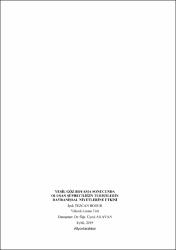| dc.contributor.advisor | Avan Ali | |
| dc.contributor.author | Tezcan Bodur İpek | |
| dc.date.accessioned | 2019-11-25T10:22:19Z | |
| dc.date.available | 2019-11-25T10:22:19Z | |
| dc.date.issued | 2019 | en_US |
| dc.date.submitted | 2019 | |
| dc.identifier.uri | https://hdl.handle.net/11630/7202 | |
| dc.description.abstract | Araştırmanın temel amacı otel işletmelerinin yeşil pazarlama faaliyetleri sonucunda bireylerin zihninde oluşan yeşil göz boyama algısının ortaya çıkardığı şüpheciliğin, turistlerin davranışsal niyetlerine etkisini belirlemektir. Bu kapsamda Afyonkarahisar’ı ziyaret eden 504 misafir ile şehir turu esnasında anket tekniğiyle araştırma gerçekleştirilmiştir. Araştırma verilerinin çözümlenmesi sürecinde tanımlayıcı verilerin analizinde yüzde, frekans, aritmetik ortalama ve standart sapma değerleri, ilişki ölçüm testlerinde Korelasyon, değişkenler arasındaki etkinin ortaya çıkarılmasında Regresyon analizi, değişkenler arası farklılıkların belirlenmesinde ise parametrik olmayan testler (Mann Whitney U, Kruskal Wallis H) kullanılmıştır.
Araştırmada toplanan verilerin analiz edilmesiyle elde edilen bulgulara göre, turistlerin yeşil şüphecilik algılarının davranışsal niyetlerine anlamlı bir etkisi olduğu tespit edilmiştir. Sonuç itibariyle misafirlerin yeşil girişimlere yönelik algılarının davranışsal niyetlerini düşük düzeyde ve olumsuz yönde etkilediği anlaşılmaktadır. Buna ek olarak, katılımcıların görüşleri incelendiğinde otellerin gerçekte iddia edildiği kadar çevreyle ilgilendiğine inanmadıkları, çevresel kaygıları abartılı ve müşterileri yanıltmaya yönelik buldukları ve çevreye duyarlı otellerde konaklamayı tercih etmeyi düşünmedikleri anlaşılmaktadır. | en_US |
| dc.description.abstract | The main purpose of this research is to determine the effect of the skepticism stemming from greenwashing, which occurs arising from green marketing practices of thermal hotel enterprises, on behavioral intentions of tourists. In this context, the study was conducted with 504 tourists who visit Afyonkarahisar by the questionnaire during their city tour. In the analysis of data collected through the survey, frequency, percentage, mean and standard deviation techniques were used in descriptive analyses, whereas Correlation and Regression analyses were performed in correlation tests, and non-parametric tests (Mann Whitney U, Kruskal Wallis H) were used in discriminant analyses.
According to the results of the analysis of the data collected in the research, we ascertained that there is a significant relationship between variables and the perception of green skepticism of tourists effect their behavioral intentions significantly. As a result, it is understood that the guests’ green skepticism perception stemming from green practices of hotels has significantly effects their intentions in a low level and negatively. In addition, when the opinions of the participants are examined, it is understood that the guests do not believe that the hotels are actually as interested in the environment as they are claimed; they find the environmental concerns exaggerated and intended to mislead customers and do not intend to prefer to stay in environmentally sensitive hotels. | en_US |
| dc.language.iso | tur | en_US |
| dc.publisher | Afyon Kocatepe Üniversitesi Sosyal Bilimler Enstitüsü | en_US |
| dc.rights | info:eu-repo/semantics/openAccess | en_US |
| dc.subject | Yeşil pazarlama, | en_US |
| dc.subject | Yeşil göz boyama, | en_US |
| dc.subject | Davranışsal niyetler | en_US |
| dc.title | Yeşil göz boyama sonucunda oluşan şüpheciliğin turistlerin davranışsal niyetlerine etkisi | en_US |
| dc.title.alternative | The effects of skeptıcısm stemmıng from greenwashıng on behavıoral ıntentıons of tourısts | en_US |
| dc.type | masterThesis | en_US |
| dc.department | Sosyal Bilimler Enstitüsü | en_US |
| dc.relation.publicationcategory | Tez | en_US |
| dc.contributor.institutionauthor | Tezcan Bodur, İpek | |



















